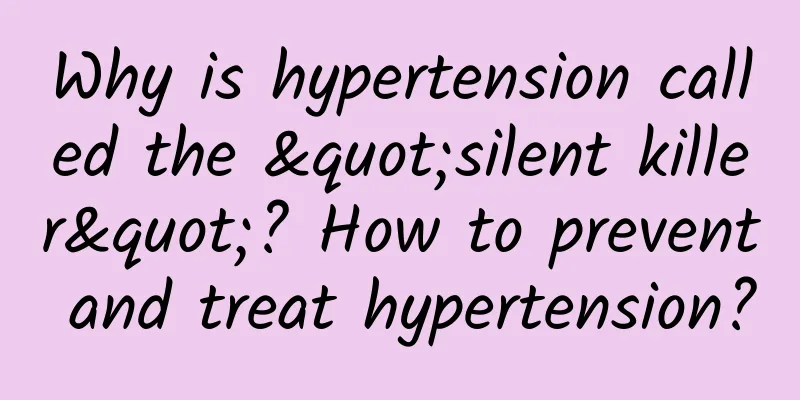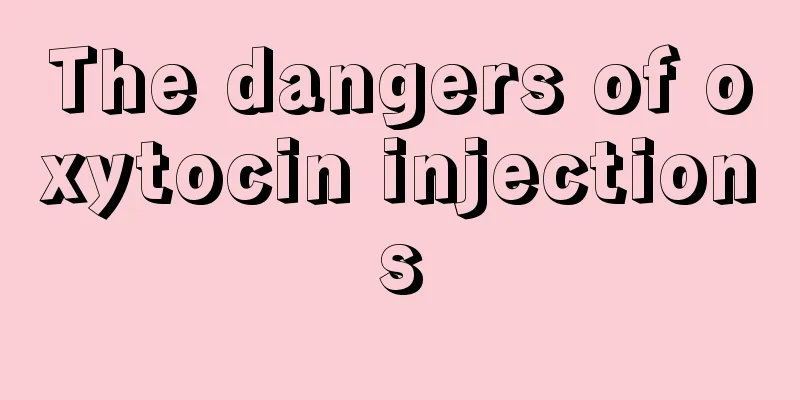Why is hypertension called the "silent killer"? How to prevent and treat hypertension?

|
Author: Mi Yuhong, Chief Physician, Beijing Anzhen Hospital, Capital Medical University Reviewer: Zhang Zhihai, Chief Physician, Guang'anmen Hospital, China Academy of Chinese Medical Sciences In the fast-paced modern life, high blood pressure, a "silent killer", is quietly attacking people's health. Since its early symptoms are not obvious, many people tend to ignore this potential health hazard. Many patients are not diagnosed until the late stage of the disease, when irreversible damage has already been caused to the body. Hypertension is a pathological condition in which blood pressure continues to rise above the normal range. Its causes are complex and varied, including genetics, environment, lifestyle and other factors. Hypertension is not always accompanied by symptoms such as headaches, dizziness, and blurred vision, so it is called a "silent killer." There may not be any obvious warning signs in the early stages, causing many patients to fail to detect and take treatment measures in time. Patients with asymptomatic hypertension often have poor treatment compliance, which often leads to more serious consequences. Long-term hypertension can cause many kinds of damage to the human body, the most common of which is damage to target organs such as the heart, blood vessels, brain and kidneys, and the condition gradually worsens over time. In the state of hypertension, the heart needs to strengthen its contraction force in order to overcome the continuously increased blood pressure. This is like an athlete making his muscles stronger through exercise, which is manifested as the initial thickening of the ventricular wall. However, this compensation of thickening has a certain limit. Continuous hypertension will cause the heart to be unable to accept the continuously increased load and become larger. As a result, the hypertrophic myocardium increases the oxygen demand at the cost of reduced contraction force, and eventually develops into heart failure. Figure 1 Original copyright image, no permission to reprint Hypertension not only causes ventricular hypertrophy, but also leads to vascular disease. Long-term hypertension can cause excessive pressure on blood vessels, accelerate vascular aging, and cause hardening and fibrosis. This not only affects the elasticity of blood vessels, but can also lead to vascular stenosis and atherosclerosis, which can hinder the blood supply to the heart, making the situation worse. As the disease progresses, hypertension gradually damages heart function, affects the heart's pumping efficiency, and may eventually lead to heart failure, seriously affecting the quality of life, and even endangering life. In addition, under high blood pressure, cerebral blood vessels are more vulnerable to damage, such as bleeding, sclerosis, and infarction, especially cerebral hemorrhage. The mortality and disability rates of cerebral hemorrhage are extremely high, posing a serious threat to the patient's life safety. Figure 2 Original copyright image, no permission to reprint Maintaining a healthy lifestyle is the key to preventing high blood pressure. It is recommended to maintain a regular work and rest schedule, eat a healthy diet, avoid excessive intake of salt and fat, exercise moderately, quit smoking and limit alcohol consumption, and maintain a good attitude. Regardless of whether or not you have symptoms such as headaches and fatigue, everyone should pay attention to their blood pressure regularly, not just routine physical examinations. Once high blood pressure is found, regardless of age, you should pay great attention to it and manage your health. For people who are entering middle age and old age, even if their blood pressure was normal in the past, they should have regular health examinations every year, and blood pressure testing is an essential item. For patients who have been diagnosed with hypertension, they should strictly follow the doctor's instructions for drug treatment and never stop taking the medication or change the dosage on their own, so as to avoid causing excessive fluctuations in blood pressure and worsening of the condition. |
<<: Intestinal flora and tumors: a game in the microscopic world
>>: What is the difference between primary and secondary hypertension? How are they treated?
Recommend
What happens if you drink water during a glucose tolerance test?
Glucose tolerance testing refers to a blood test ...
What surgery is best for uterine fibroids?
If the uterine fibroids are serious and grow larg...
Popularization of Yolk Sac Knowledge
The yolk sac is the first extraembryonic structur...
What to do if you have a cold and low milk supply during breastfeeding
If mothers get sick during breastfeeding, their b...
What are the methods to speed up the disappearance of the cervical canal?
The cervical canal is located below the female ut...
How does ectopic pregnancy occur?
Because many young women have no experience, they...
How to remove the IUD? The correct way to remove the ring
There are some things to pay attention to when in...
What is the difference between natural wine and wine? The difference between dry white wine and dry red wine
The dry red wine we often drink is brewed with sk...
Can the black film in the fish belly be eaten? How to remove the black film in the fish belly
When we process fish, we will find a layer of bla...
What kind of tea is good for women to drink if they want to remove freckles?
Drinking tea is an important thing in the daily l...
Pregnancy is like being sick
Most women will feel some stomach discomfort in t...
Cold medicine suitable for pregnant women
We all know that doctors generally do not recomme...
What causes memory loss after childbirth?
Becoming a mother for the first time is a very ha...
What are the obvious symptoms of ovulation?
Women’s menstruation has a certain cycle. General...









